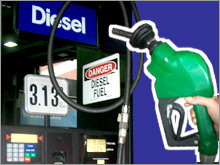GM exec cool on dieselsIn blog video, vice-chairman Bob Lutz points out the shortcomings of fuel-efficient diesel engines for the United States.NEW YORK (CNNMoney.com) -- In a video posted to his official General Motors blog Thursday, GM vice chairman Bob Lutz took pains to point out that fuel-efficient diesel engines, popular in Europe, will not provide an easy an easy answer to America's petroleum dependence. "Do not assume that the diesel engine is a panacea and is going to make everyone get to a fleet of 36 miles per gallon," Lutz says in the video.  The popular notion Lutz is trying to refute is that diesel vehicles, already popular in Europe, offer the fuel economy benefits of gasoline/electric hybrid vehicles but without all the added cost and complexity of gasoline/electric hybrid technology. The problem, according to Lutz, is that to make diesel engines work for the American passenger vehicle market, which is very different from Europe's, will require adding technology. That means adding complexity and cost, just like hybrids. What's worse, along with adding cost and complexity, is that these technologies will also reduce a diesel vehicle's fuel economy, taking away the very reason for turning to diesel in the first place, said Lutz. The basic problem, according to Lutz, has to do with increasingly tough vehicle emissions standards in the United States. In most of the United States, these standards are already much more stringent than in Europe and they're getting tougher. In some states, those that follow California's emissions standards, these rules are tougher still. It's not that diesels can't meet those standards. Diesel engines ordinarily produce much more smog-forming pollution than gasoline engines, though. Meeting these standards will mean lots of complex and expensive emissions control technologies. That technology will add cost, said Lutz, as much as $2,800 per vehicle. Diesel vehicles already cost more than gasoline-powered vehicles because the engines themselves, built tough to withstand the high compression diesel relies on, are more expensive to begin with. Lutz put the current cost premium of a diesel engine at about $2,000. That kind of added cost would take away much of the incentive for consumers to buy diesel vehicles. It would take a long time to make that money back through fuel savings. "Are buyers of smaller cars actually going to pay a $4,000 to $5,000 premium to get a diesel engine, when the tougher the emissions [standards] you have to meet, the more the fuel efficiency savings [as compared to a gasoline engine] shrinks?" Lutz says in the video. As more emissions control technology is added, the fuel efficiency savings of diesel engines could be cut to as little as 12 to 15 percent over gasoline engines, Lutz estimated. And that's compared to current gasoline engines, not taking into account technologies being investigated that could make gasoline engines about as efficient as diesel engines. Some of what Lutz says is in his blog video is contradicted by diesel proponents as well as the the publicly announced plans of other carmakers and, to some extent, by GM's own publicly announced plans. For example, GM's diesel engines, which are planned be sold in all 50 states - including those that use stricter California emissions standards - would probably still be about 25 percent more fuel efficient than a similar gasoline engine, said Charlie Freese, executive director for diesel technology at GM. (Freese had not seen Lutz's video and could not be certain exactly what Lutz had in mind when he spoke of a possible reduction in fuel efficiency to 15 percent.) Also, Lutz says in the video blog entry that emissions technology that will make diesels widely available in the United States will have to involve injecting a chemical called urea into the exhaust stream. (In addition to adding cost, that would add a maintenance hassle - refilling the urea tank - for car owners.) Urea injection can reduce emissions of smog-forming pollutants by about 90 percent. Even if that technology is used, Lutz says in the video, it will still not allow the vehicles to be sold in all 50 states, including those with California-style emissions standards. Honda, however, has already announced it will begin selling a 4-cylinder diesel-powered car in 2009. It will be available in all states and it will not use urea injection, the company has said. Mercedes-Benz has also said it would begin selling diesel SUVs in all 50 states. GM has already announced plans to introduce a 4.5-liter diesel engine that will be available in the company's light-duty trucks and SUVs, including the Hummer H2, in late 2009. That engine will use urea injection and will be available in all 50 states, a GM spokeswoman said later. A smaller V6 engine mentioned by Lutz in the video will not be used in the United States, as currently planned, the GM spokeswoman said. It will be used in the Cadillac CTS sold in Europe. |
|
